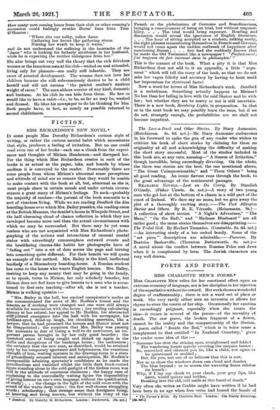FICTION.
MISS RICHARDSON'S NEW NOVEL.* Ire some people Miss Dorothy Richardson's curious style of
writing,. or rather the curious mental habit which necessitates that style, produces a feeling of irritation. But no one could read even one of her books—each one a chunk from the ex-peri- ewes- and thoughts of Miriam Henderson—and disregard her.
For the thing which Miss- Richardson creates in each of the boars is as actual as the paper, inks, and boards by whose medium it is conveyed- to the reader. Presumably there -are some people from whom Miriam's 'abnormal sense perceptions and attitude of mind are so remote that they would be unable
to make content with the. book at all, but, abnormal as she is, most people share in certain moods and under certain circum- stances a great many of Miriam% feelings. To such—probably the majority of readers---the perusal of the book amounts to a
sort of- vicarious living.. While' we are reading Deadlock the dim boarding)hcruse-over which Mrs. Bailey presides, the reading-roore atthe British-Museum, the'dentist's house in Wimpole Street, and the: half obscuring. cloud - of chance reflection in which they are enveloped become more real-than the actual circumstances with which- we may be surrounded. But there may be yet some readers who are not acquainted with Miss- Richardstm's photo- graphing of the actions and interactions of unusual mental states' with- exceedingly commonplace outward events and the bewildering cinema-like habits her photographs have of " fading out " into a set of dots across the- page and turning into something quite different. For their benefit we will quote an example of the method. Mrs. Bailey is the kind, ineffectual landlady of a Bloomsbury boarding-house. A Russian student has come to the house- who wants English lessons. Mrs. Bailey, desiring to keep any money that may be going in the family, so to speak, turns to Miriam, her only scholarly boarder, but Miriam does not feel keen-to-give lessons to a man who is aeons- tOined to- first-rate teaching—after all, she is not a teacher.
Miriam is walking upstairs :-
"Mrs. • Bailey in the hail, her excited conspirator's smiles as she communicated the news of Mr. Rodkin 'a friend and• the lessons, as- if nothing were changed -and one were still always available for association with the house ; her smiling calculating dismay at her refusal, her appeal to Mr. Rodkin, his abstracti3d stiff-jointed emergence into the hall with his newspaper, his' brilliant-eyed, dried-up laugh, his chuckling assertion, like a lawyer, that he had promised the lessons and. Shatov must not- be disappointed ; the suspicion that Mrs. Bailey was passing the moments in fear of losing a well-to-do newcomer, 'an mi.-- portant person brought in ;by- her only- good boarder ; the- wretched sense of being caught and linked, up again in the shifts and deceptions- of the bankrupt house ; the uselessness ; the certainty that.the new man, aS described, would be retained only by his temporary ignoranrce-and helplessness, the vexatious thought-of him,- waiting upstairs in the-drawing-room in a state of groundlessly aroused' interest's and anticipation, Mr. Rodkin's irresponsible, admiring - spectator's confidence as he made the, introductions and vanished whilst the little dark frock-coated figure standing' MOM in the-cold gaslight of the fireless room was still in the attitude:of:courteous obeisanee ; the- happy ease of eacliiaiping to the controlledly waiting figure -the impossibility : of giving lessons on one's own language without the qualification of-study ; . . . the change- in the light of the cold room with the round of the 'warm deep voice; the few well-chosen Struggling words scholarship ; that strange sense that foreigners bring; of- knowing- and being known,- but without the irony- • of the • Deadlock. By Dorothy M. xichardson. London : Duckworth. Os. net.] Freneh or the .plebeianism of Germans and Scandinavians, bringing a consciousness of being On trial, but without reeponsa bility.. . . The trial would bring exposure. Reading and discussion would reveal the ignorance of English literature. . . . The hour of sitting accepted as a student, talking easily, the right phrases remembering themselves in French-and German, would not come again the sudden outbreak of happiness after mentioning Ronan ;. . . how had she suddenly ]mown that he made the Old Testament like a newspaper ? Parfaiknwnt ; jai toujours ete fort interesse dens laphilosophic' "
This is the manner of the book. What a pity it is that Miss Richardson does not add to it an appendix, a little " argu- ment " which will tell the story of the book, so that we do not miss her vague felicity and accuracy by having to hunt amid her impressions for structural facts!
Now a word for lovers of Miss Richardson's work. Deadlock is a melodrama. Something actually happens to Miriam-I No less than her falling in love with the said Shatov and he with her ; but- whether they are to marry or not is still uncertain. There is a new book, Revolving Lights, in preparation. In that or in the next book we may possibly learn the issue, but if we do not, strangely enough, the probabilities are we shall not become impatient.


































 Previous page
Previous page